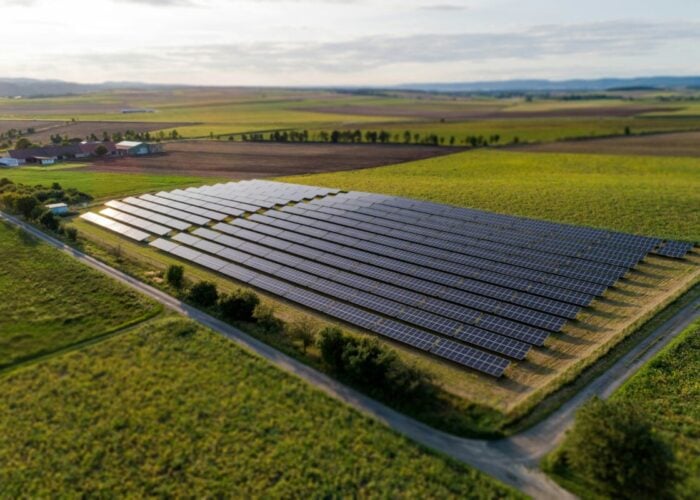Six early-stage and established photovoltaic companies based in California and New England have been awarded up to $17.6 million to develop advanced solar PV manufacturing technologies as part of the Solar America Initiative, the U.S. Department of Energy announced. DOE says that, including the cost
share from industry–which will be at least 20%– the total
research investment is expected to reach up to $35.4 million. The projects are part of the initiative’s goal of making solar energy cost-competitive with conventional electricity sources by 2015.
After their subcontracts are negotiated through DOE’s National
Renewable Energy Laboratory (NREL), six companies will
begin 18-month projects:
Try Premium for just $1
- Full premium access for the first month at only $1
- Converts to an annual rate after 30 days unless cancelled
- Cancel anytime during the trial period
Premium Benefits
- Expert industry analysis and interviews
- Digital access to PV Tech Power journal
- Exclusive event discounts
Or get the full Premium subscription right away
Or continue reading this article for free
- 1366 Technologies (Lexington, MA) will receive up to $3 million to help in its development of a new cell architecture and related processes for low-cost
multicrystalline silicon cells. This project is expected to enhance
cell performance by light-trapping texturing and grooves for
self-aligned metallization fingers. By improving the light trapping and
charge carrier movement within the cell, this project will
significantly increase the efficiency of multicrystalline cells. By
the end of the project, 1366 Technologies plans to deliver a 19%
efficient, 15.6 x 15.6 cm2, multicrystalline silicon cell with a
technology that is applicable across the crystalline silicon cell
industry. - Innovalight (Sunnyvale, CA) will receive up to $3 million to develop very
high-efficiency, low-cost solar cells and modules, which use ink-jet printing of
the company’s proprietary “silicon ink” onto thin-crystalline silicon wafers. The company’s contactless printing process has been shown to
significantly reduce both the manufacturing costs and the complexity
required to make today’s highly efficient cells and modules. - Skyline Solar (Mountain View, CA) will receive up to $3 million for its efforts to further develop
an integrated lightweight, single-axis tracked system that has been
demonstrated to reflect and concentrate sunlight more than 10X onto silicon
cells. The use of mirrors to concentrate light will reduce the use of
the greatest cost driver for traditional silicon modules, the solar
cells, by over 90%. Additionally, the design leverages the mainstream
PV industrial base and amplifies its capacity through significant
concentration to enable rapid scaling. It seeks to dramatically lower
the cost to manufacture modules and install complete systems to achieve
a levelized cost of energy below grid parity. By the end of this
project, Skyline plans to deliver modules that exceed 12 m2 area and 15% aperture-area efficiency. -
Solasta (Newton, MA) will receive up to $2.6 million for development of a novel cell
design based on an amorphous-silicon “nanocoax” structure, which
increases current and lowers materials cost by shortening the path
charge carriers must travel to the cell’s conducting wires. This
approach effectively decouples the optical and electronic pathways. If
successful, the company will deliver 15% efficient, 100 cm2 preproduction cells at the end of the project. - Solexel (Milpitas, CA) will receive up to $3 million to move forward on its plans to commercialize a
disruptive, 3-D, high-efficiency monocrystalline silicon cell
technology, while dramatically reducing manufacturing cost per watt.
Through a series of novel yet low-cost processing steps, this project
will manufacture a solar-cell architecture which efficiently traps
light using minimal material. At the end of this project, Solexel plans
to deliver a 17-19% efficient, 156 x 156 mm2, single-crystal cell
that consumes substantially lower silicon per watt than conventionally
sliced wafers. Solexel aspires to be a gigawatt-scale PV producer
within five years. - Spire Semiconductor (Hudson, NH) will receive up to $2.97 million to work on its plans to open
up the design space for three-junction tandem solar cells by growing
differentiated bifacial cells on a gallium arsenide substrate. This
approach will allow the company to better optimize the optical properties of
their device layers to better match the solar spectrum. Spire
Semiconductor is targeting cell efficiencies >42% using a
low-cost manufacturing method.
“These projects will help promote the development of a diverse
set of photovoltaic technologies and ensure that the U.S. is a world
leader in next-generation, cost-effective solar technologies,” said John Mizroch, DOE’s acting
assistant secretary for energy efficiency and renewable energy. “These solar photovoltaic incubator awards will help
accelerate the time it takes for innovative start-up companies to get
their technologies to market.”
— Tom Cheyney






